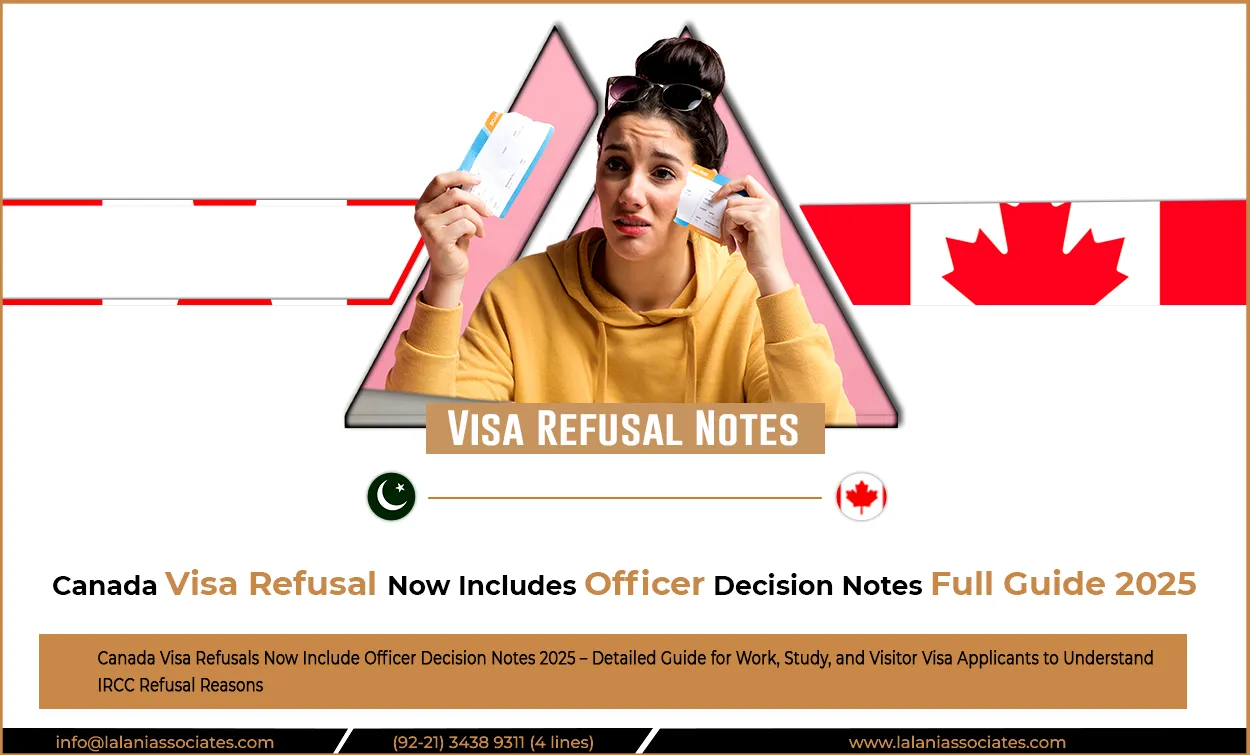
🧭 The IRCC is now more open than ever
Have you ever been bewildered when your request for a Canadian visa was turned down? A lot of the time, it can be hard to understand, hard to cope with, and not fair. Things are getting better, though, on July 29, 2025. For some types of temporary residency petitions, Immigration, Refugees, and Citizenship Canada (IRCC) has started sending denial letters that include notes from the officer who made the decision. You can now question the officer who turned down your visa why they did it.
Doesn't it seem like a big step forward? Let's go over everything so you know what to expect and how to use this new information to your advantage.
📄 What Are Officer Decision Notes?
Officer decision notes might help you understand why your application was turned down. Before this update, you might have just gotten a vague reason that wouldn't have helped you much if you tried to apply again. But now, the person who is examining your case will tell you what went wrong.
These notes may include:
• Specific concerns about your documentation
• Reasons for questioning your intent to return home
• Red flags that impacted your eligibility
This is the most immediate and real-time feedback you can obtain on your application without having to send in more requests.
✅ Which apps will have Officer Decision Notes?
Not all applications are eligible for these notes just yet. Here's what’s included as of now:
🗂 Types of Applications Covered
• Temporary Resident Visas (TRVs) - excluding eTAs and TRPs
• Visitor Records
• Study Permits
• Work Permits
🚫 What’s Not Covered Yet?
• Electronic Travel Authorizations (eTAs)
• Temporary Resident Permits (TRPs)
• Applications submitted via the new IRCC Portal
IRCC has said, though, that it will add officer remarks to more types of applications in the future.
📬 How Will You Receive Officer Decision Notes?
The good news? You don’t have to do anything extra to get them.
📨 Automatic Delivery
If your application fits within one of the categories above and is turned down, the IRCC will immediately send you the officer's decision notes with the refusal letter. You can send this via email or regular mail to:
• You directly, or
• Your authorized immigration representative
🔒 Redactions Possible
IRCC may remove parts of the note if there are:
• Security risks
• Privacy concerns
• Legal limitations
Don't be startled if some parts are blanked out; it's for safety and compliance concerns.
🔍 Want More Details? Here’s Where GCMS Notes Come In
Officer notes are a good place to start, but if you want more information, you'll need to ask for GCMS notes (Global Case Management System notes).
You (or your representative) must formally ask for GCMS notes, unlike officer decision notes, which are supplied without you having to ask.
📘 What Are GC-MS Notes?
The Canada Border Services Agency (CBSA) and Immigration, Refugees, and Citizenship Canada (IRCC) employ GCMS notes as internal case files. These reports are very detailed and include:
• All correspondence with IRCC
• Processing timelines
• Officer comments and observations
• Supporting documents
• Application history
GCMS notes give you the most complete picture if your case seems to be taking longer than expected or if you got a denial and want to know everything.
👥 Who Can Request GCMS Notes?
You can’t just Google it and click “download.” There are rules:
🇨🇦 Inside Canada
• Canadian citizens
• Permanent residents
• Anyone physically in Canada
🌍 Outside Canada
If you’re outside Canada, you’ll need:
• A Canadian citizen or resident to submit on your behalf
• A signed consent form giving them permission
This is where a skilled immigration expert can truly help.
📅 When Can You Request GCMS Notes?
You can only ask for GCMS notes after your application has passed the R-10 completeness assessment. This is when IRCC checks that all the necessary papers have been sent in and that your application is officially in the system.
⏳ Best Time to Request
• After your file starts processing
• Or, once a decision is made, and you need to understand the refusal
If you ask too soon, you might not get helpful information.
📝 How to Request GCMS Notes: A Simple 3-Step Process
Step 1: Gather Your Details
Make sure you have:
• Full name
• Date of birth
• Application number
• UCI (Universal Client Identifier)
• Contact details
Step 2: Submit an ATIP Request
Go to the official IRCC website and ask for Access to Information and Privacy (ATIP). Your representative will do this if you are not in Canada.
Step 3: Pay the $5 Fee
If you apply by mail, you can pay with a credit or debit card online or send a check or money order.
🌟 Why Officer Notes Are a Game Changer
Many people who filed for visas didn't know why they were turned down for years. Police notes make things plain right away. This is useful:
• Find the parts of your application that aren't very good
• Make a better case next time
• Don't make the same mistakes
Now that you have your report card, you know exactly what you need to do to get better, even if you didn't pass.
👨💼 Consult With an Immigration Expert
Having a professional visa consultant on your side makes a bigger impact than before.
An expert can:
• Help you understand the notes from the officer and GCMS
• Rebuild your case depending on what went wrong.
• Make sure your next application is considerably better
If you genuinely want to go to Canada to visit, study, or work, don't leave your future to chance.
🧾 Final Thoughts
Adding comments from officers to refusals is a significant step toward being honest and upfront. If you've been turned down before and don't know what to do, now is the time to take charge of your application process with real information.
If you know exactly why your application for a study permit, work visa, or visitor record was denied, you can come back stronger.
Don't wait for another "no." Take notes and ask an expert for aid.
❓FAQs
1. Can I appeal a visa denial if I have the officer's decision notes?
The officer's notes don't guarantee a successful appeal, but they do give you a good basis for challenging the judgment or reapplying correctly.
2. Are notes from officers always detailed?
Not all the time. Some are more general, while others provide you with precise information. Your case and the reviewing officer will decide.
3. Do I still require GCMS notes if I have notes from the officer's decision?
Yes, GCMS notes have a lot more information, like the whole case history, timelines, and comments from inside that aren't in officer notes.
4. How long do you have to wait to get GCMS notes?
It usually takes about 30 days, although it could take longer for certain circumstances.
5. Can I get both officer notes and GCMS notes for the same refusal?
Of course. Officer notes are now sent automatically, and you can ask for GCMS notes at any point after your application passes R-10.


0 Comments